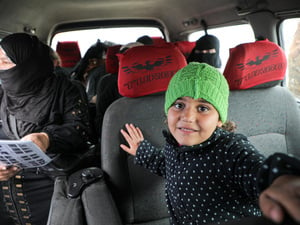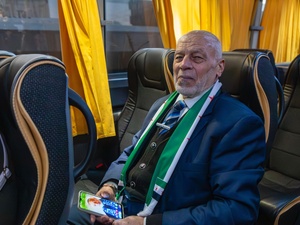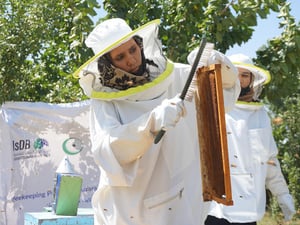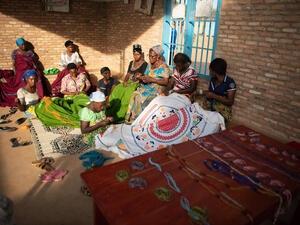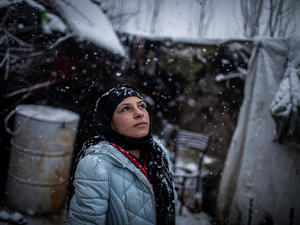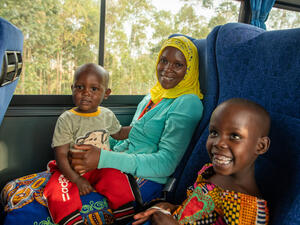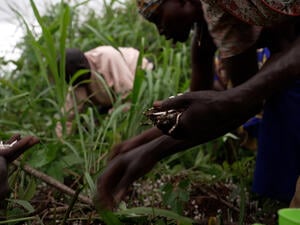UNHCR seeing significant returns of internally displaced amid Syria's continuing conflict
UNHCR seeing significant returns of internally displaced amid Syria's continuing conflict

In the badly damaged Al-Shaar neighbourhood in East Aleppo, returnee families and displaced residents receive UNHCR relief assistance at a distribution point run by the Al Ihsan charity in March 2017.
UNHCR, the UN Refugee Agency, is seeing a notable trend of spontaneous returns to and within Syria in 2017.
Aid agencies estimate that more than 440,000 internally displaced people have returned to their homes in Syria during the first six months of this year. In parallel, UNHCR has monitored over 31,000 Syrian refugees returning from neighbouring countries so far in 2017. Since 2015, some 260,000 refugees have spontaneously returned to Syria, primarily from Turkey into northern Syria.
The main factors influencing decisions for refugees to return self-assisted mostly to Aleppo, Hama, Homs, Damascus and to other governorates are primarily linked to seeking out family members, checking on property, and, in some cases, a real or perceived improvement in security conditions in parts of the country.
Given the returns witnessed so far this year and in light of a progressively increased number of returns of internally displaced people and, in time, refugees, UNHCR has started scaling up its operational capacity inside Syria. In order to adequately address the initial needs of IDP returnees, UNHCR - as part of the overall UN response inside Syria - will expand its humanitarian and protection response with a strong emphasis on providing protection services, improving shelter conditions and assist in the rehabilitation of some essential infrastructure and basic essential services, all in close coordination with respective sector lead agencies and partners.
Outside of Syria, UNHCR is strengthening monitoring of border movements and analysis of refugee intentions to be on top of any changes that could lead to a refugee return, while ensuring that refugees’ own voices are centre-stage in any planning around return.
While there is overall increased hope linked to the recent Astana and Geneva peace talks, UNHCR believes conditions for refugees to return in safety and dignity are not yet in place in Syria. The sustainability of security improvements in many return areas is uncertain, and there remain significant risks of protection thresholds for voluntary, safe and dignified returns not being met in parts of the country. Access to displaced population inside Syria remains a key challenge, with aid convoys still unable to access regularly even the recently newly accessible areas.
Other challenges to any sustainable and large-scale returns include limited livelihood opportunities, shortages of food and water, sporadic or non-existent health, social and other basic services. Many of Syria’s schools have been damaged or destroyed and offer no possibility for education.
At this stage and while UNHCR will be investing to help, with other partners to improve conditions in accessible areas inside Syria, refugee returns from host countries can neither be promoted nor facilitated by UNHCR at this stage.
For the 5 million refugees who are generously hosted in the region, and despite some self-organized returns, there is a clear need to continue to fund and support programmes in host countries, primarily through the inter-agency 3RP regional strategy and appeal.
Ensuring access to asylum for Syrian refugees and preserving the ability and conditions for them to stay in the host countries remain critical. Meanwhile, we will also continue to monitor return movements, plan and implement our response both inside and outside Syria in partnership with UN agencies and NGOs as part of the overall UN response inside Syria. In that regard, UNHCR is pursuing a number of preparatory steps, in anticipation of the time when conditions for voluntary repatriation of refugees in conditions of safety and dignity are in place.
Of the US$304 million that UNHCR has appealed for operations to assist IDPs inside Syria in 2017, US$103 million or 33% has been received. UNHCR will be seeking an additional US$150m in 2017 to ramp up its delivery inside Syria to support both IDPs, returnees and other vulnerable people, and to help improve conditions in potential return areas.
For more information on this topic, please contact:
- In Geneva, Andrej Mahecic, [email protected], +41 79 642 97 09
- In Syria, Firas Al-KHATEEB, [email protected], +963 930 403 228
- In Syria, Scott CRAIG, [email protected], +962 7 9276 0640


